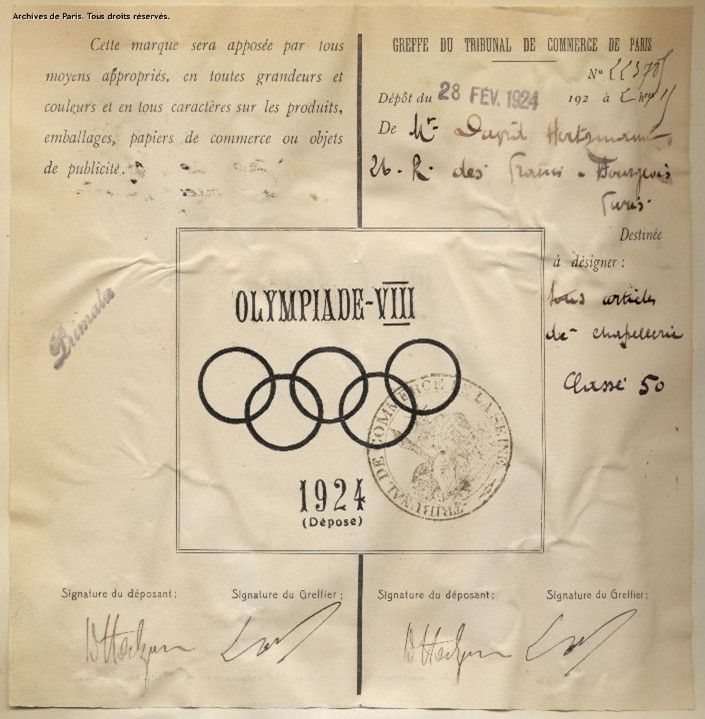Paris 2024: the Olympic Games and Intellectual Property
One hundred years ago, from May 4 to July 27, 1924, the eighth Olympiad of the modern era was held in Paris. Already at that time, the International Olympic Committee paid attention to the protection of the Olympic intellectual properties. Below is the trademark filed in 1924 for the Olympic Games in Paris.

- What are “Olympic properties”?
This refers to the Olympic and Paralympic symbols, flags, mottos, anthems, identifications, designations, emblems, flames, and torches. It also encompasses any musical or audiovisual work, creation, or object commissioned in connection with the Olympic and Paralympic Games by the International Olympic Committee (IOC), the International Paralympic Committee (IPC) and other national official organizations.
All rights to these properties, along with any related rights of use, are exclusively owned by the IOC and the IPC.
- How are the Olympic properties protected?
These elements are protected by copyright, registered and/or well-known trademarks, designs, and models, as well as the laws governing them, particularly concerning counterfeiting, parasitism, and unfair competition.
For example, the use of the Paris 2024 emblem or the image of the torch on the shop from an unauthorized official partner will be an “ambush marketing” and an infringement of the Olympic properties.
In French law, parasitism is a special kind of unfair competition. One specific application of parasitism involves unduly capitalizing on a major event, especially a sporting event, by exploiting the investments and efforts made by the rights holders.
There are also sector-specific regulations. For example, Article L141-5 of French Code of Sport provides that:
“I. The French National Olympic and Sports Committee is the owner of the national Olympic emblems.
It is also the custodian of:
1. The Olympic emblems, flag, motto, and symbol;
2. The Olympic anthem;
3. The logo, mascot, slogan, and posters of the Olympic Games;
4. The year of the Olympic Games ‘city + year’, in conjunction with the French Paralympic and Sports Committee;
5. The terms ‘Olympic Games’, ‘Olympism’, and ‘Olympiad’ and the acronym ‘JO’;
6. The terms ‘Olympic’, ‘Olympian’, and ‘Olympienne’, except in common parlance for normal use excluding any promotional or commercial purposes or any risk of causing confusion in the public's mind with the Olympic movement.
II. The act of registering as a trademark, reproducing, imitating, affixing, deleting, or modifying the elements and terms mentioned in paragraph 1 or their translations, without the authorization of the French National Olympic and Sports Committee, is punishable by the penalties set out in Articles L. 716-9 to L. 716-13 of the Intellectual Property Code.”
- The active defense of the Olympic properties in France
The IOC and the IPC are fully engaged in the protection of Olympic property. Indeed, the rulings issued, particularly by the European Union Intellectual Property Office (EUIPO) and the French National Institute of Industrial Property (INPI), are quite comprehensive. It appears that the incorporation of the verbal sequence “OLYMP” in a trademark application frequently results in the rejection of that application by the trademark office.
Since Paris become the host city for the Olympic Games in France, the IOC has actively opposed to French trademark filings containing similar sequences to the official terms. For example, it opposed to the French trademark applications “JOSE LYMPICS”, “CLIPPERS ROUTE CHALLENGE 2024” and “MARSEILLE 2024 ACCESSOIRES” since the End of 2023. INPI supported the oppositions of the IOC and rejected the applications.
In the past, French courts have also demonstrated a favorable stance towards the IOC. During the Winter Olympics in PyeongChang in 2018, the French bank CIC used the slogan “On the road to the #PyeongChang2018 Winter Olympics!” on its social media. The Paris Tribunal ruled against the bank, rejecting its claim of a general need for communication, and decided in favor of the IOC.
As we eagerly await the thrilling events of the Paris Olympic Games, we know that the International Olympic Committee remains vigilant and proactive!














